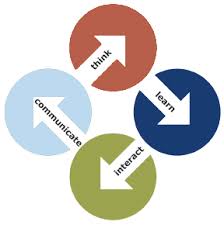Date of Notice: March 14, 2018
Current Status: Notice Given
Motion Type: Legislation
Sponsor: Core Education Task Force
Motion
Section I
1.1 WHEREAS The Mission of the University of Oregon is:
The University of Oregon is a comprehensive public research university committed to exceptional teaching, discovery, and service. We work at a human scale to generate big ideas. As a community of scholars, we help individuals question critically, think logically, reason effectively, communicate clearly, act creatively, and live ethically; and
1.2 WHEREAS The combined curriculum common to all undergraduate degrees, the Core Education, should serve the mission of the university; and
1.3 WHEREAS Clearly articulated learning goals are useful for student success; and
1.4 WHEREAS Clearly articulated criteria for how a course meets learning goals is useful for UOCC course approval; and
1.5 WHEREAS Clearly articulated criteria for how a course meets learning goals are useful for assessment of student learning in that course; and
1.6 WHEREAS The American Association of Colleges and Universities has developed nationally vetted learning goals and criteria for many categories of learning outcomes common between institutions; and
1.7 WHEREAS Accreditation standards require that institutions demonstrate how their common curriculum supports their institutional mission; and
1.8 WHEREAS Accreditation standards require that the institution establish and assess student learning goals for its general education program.
Section II
2.1 BE IT THEREFORE MOVED that the University Senate establish the following categories of Learning Goals derived from the University Mission: Critical Thinking, Creative Thinking, Written Communication and Ethical Inquiry. These categories of Learning Goals will be called Methods of Inquiry.
2.2 BE IT THEREFORE MOVED that when approving new courses which satisfy one of the Areas of Inquiry of Arts & Letters, Social Sciences and/or Natural Sciences, the UOCC will ensure that, in addition to the learning goals relevant to the Area of Inquiry(ies), courses will only be approved if they address learning goals from at least two Methods of Inquiry.
2.3 BE IT THEREFORE MOVED that when approving courses which satisfy one of the Areas of Inquiry of Arts & Letters, Social Sciences and/or Natural Sciences, the UOCC will require approved courses to address at least half of the criteria for the relevant Methods of Inquiry.
2.4 BE IT THEREFORE MOVED that the Core Education Council will develop and bring to the Senate for approval guidelines for assessing the learning goals in Methods of Inquiry.
2.5 BE IT THEREFORE MOVED that the Core Education Council will regularly review Methods of Inquiry and recommend changes to the Senate when appropriate.
Presentation with Methods of Inquiry
Learning goals (paragraph) and criteria (bullets) for Methods of Inquiry
Critical Thinking
Students will develop the skills and habits of mind necessary for the comprehensive exploration of issues, ideas, artifacts, and events in the evaluation and formulation of opinions and conclusions. Critical thinking requires students to question critically, think logically and reason effectively in the context of discipline-specific methodologies.
- Explanation of issues, assumptions, or hyptheses
Evidence: Selecting and using information to investigate a point of view or conclusion Using relevant and credible evidence, information, or hypotheses to describe, investigate or analyze a situation, or draw a conclusion.
- Facility with methods of reasoning appropriate to the discipline (such as inductive, deductive, scientific, or esthetic reasoning, or statistical inference)
- Modeling: Capturing the essentials of a situation in language or symbolism suitable for deriving conclusions about it.
- Influence of context and assumptions
Student’s position (perspective, thesis/hypothesis)- Logical conclusions and related outcomes (implications and consequences)
Creative Thinking
Students will develop the capacity to combine or synthesize existing ideas, images, or expertise in original ways, and work in an imaginative way characterized by a high degree of innovation, divergent thinking, and risk taking.
- Acquiring Competencies: acquiring strategies and skills within a particular domain.
- Taking Risks: going beyond original parameters of assignment, introducing new materials and forms, tackling controversial topics, advocating unpopular ideas or solutions.
- Solving Problems
Embracing Contradictions- Innovative Thinking: connecting, synthesizing or transforming ideas in discipline-specific ways.
Connecting, Synthesizing, Transforming
Written Communication
Through iterative experiences across the curriculum, students will develop the capacity to develop and express ideas in writing, to work in different genres and styles, work with different writing technologies, and mix texts, data, and images to effectively communicate to different audiences.
- Context of and Purpose for Writing: considerations of audience, purpose, and the circumstances surrounding the writing task(s).
- Content Development
- Genre and Disciplinary Conventions: Formal and informal rules inherent in the expectations for writing in particular forms and/or academic fields
- Sources and Evidence
- Control of Syntax and Mechanics
Ethical Reflection
Students will develop the capacity to identify, examine, and critically revise ethical positions, map them onto larger ethical ideas (theoretical traditions, moral frameworks, prevailing social frameworks), and reflect on how decisions and actions (including, sometimes, inaction) shape our relations to others and self. Students will develop the capacity to articulate the ends sought in a range of endeavors in personal, social and professional contexts. Students will also develop concepts, practices, and other tools appropriate to valuing those ends in relation to their means of attainment and their impacts on self and others.
- Awareness of one’s own values and capacities for self-questioning
- Language and tools to examine ethical issues, including discipline-specific frameworks
- Recognition of the presence of ethical issues, especially where typically neglected
- Awareness of impacts of our decisions and actions (both personally and as members of groups)
- Application of ethical inquiry to subject-specific issues


